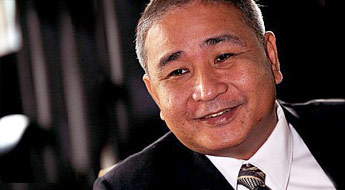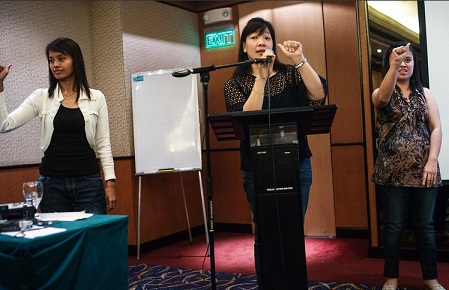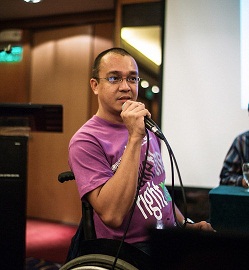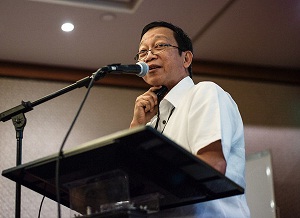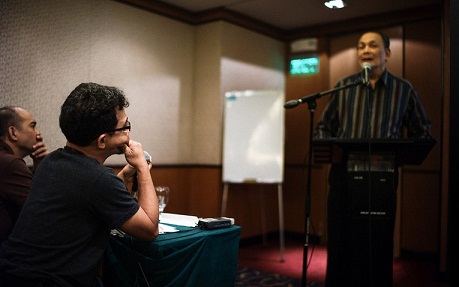By Bibeth Orteza
Philippine Daily Inquirer
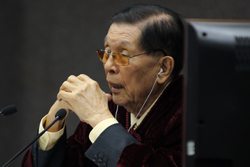
Sharp as ever at 88!
8:15 a. m.
The man of the house is still in his bedroom. Sally Moneda, his cook and personal assistant of 26 years, reminds his close-in aide, Julius Gumban, not to take away the newspaper as “he has not read Bernas [constitutionalist Fr. Joaquin Bernas, SJ, who writes an opinion column in the Inquirer–Ed].”
The books under the stairs include the New King James Version of the Holy Bible (quick reference edition); “Spiritual Politics” by Gordon McLaughlin and Gordon Davidson; “His Excellency, George Washington” by Joseph J. Ellis; “1,000 Places to See Before You Die” by Patricia Schultz; and “The Oxford Companion to Politics of the World” by Joel Krieger.
Also “Presidential Plunder, the Quest for the Marcos Hidden Wealth” and “Struggle and Hope,” both by Jovito R. Salonga, right next to five books written by Ferdinand E. Marcos during his martial law years.
On the flyleaf of “The Marcos Years,” the former president had handwritten a dedication to the man who would remain his secretary of national defense until 1986 when a People’s Power revolt, aided and abetted by the latter, toppled his dictatorship.
“Sept. 10, 1972, on the eve of my birthday
To Johnny, who has contributed to the achievements of the Marcos years in a large way.”
8:25 a.m.
Bing Rosales, sent to study reflexology for two years after showing aptitude for the therapy, leads her boss down the stairs. “He’s good to us, so we pray that nothing bad happens to him,” she says.
“Good morning, good morning!” exclaims Juan Ponce Enrile.
First, his blood pressure is checked. It is normal at 126/60, from a high of 190/90 the previous afternoon. It shoots up every now and then so he has to take maintenance medication.
He really should sleep early but just the other day, he didn’t hit the sack until 4 a.m., he says. His bedtime varies, depending on the amount of reading he feels he has to do because, he says, he has to study and weigh things as well as he can.
“You see, I am not the court. The Senate is the court,” he says. “I sign the subpoenas, but I need the permission of the court. There is equal weight among the rights of the respondents, the policy of government, the impact of the decision on the public, on the business sector, on everybody. (If we) block disclosures on the basis of loyalties, the public will think we are covering up. People don’t really know the law as much as they do their doubts and their suspicions.
8:30 a.m.
Breakfast is a sausage with a dab of mustard. Sometimes it’s a bowl of oatmeal, eaten with inihaw na pusit (dried squid), or rice with scrambled eggs and tuyo (dried fish). Some mornings it is pan de sal (roll) with cheese.
Enrile is told this paper has referred to him and defense counsel Serafin Cuevas as the “superstars” of the ongoing trial.
He shrugs, “I don’t know what that infers.”
He likes to pore over his cases alone, he says, and tests the validity of the opinions of others against his own study of all the issues involved.
“I make my own trial brief,” he adds.
In the years when he was practicing law, he says, he would first check a case for any violations against the Constitution, and then study the laws that could apply, given the facts, the pleading or the complaint.
“I was fortunate to have met brilliant minds in and out of court,” he recalls, such as Vicente Francisco, Jose W. Diokno, Alberto Jamil, Rod Jalandoni, Claudio Teehankee, among others.
At 88, he can still name his professors at the University of the Philippines College of Law where he received his law degree in 1953.
“Jose Espiritu for corporation law, Emiliano Navarro for criminal law, Enrique Fernando for constitutional law, Peping Campos for negotiable instruments law, Norberto Quisumbing for trial technique, Bienvenido Ambion for torts and damages, Mrs. Laurea—I forget her first name (it’s Norberta)—for contract law and family relations, Juan T. Santos, “who made us memorize the Rules of Court from cover to cover, my goodness.”
He asks Sally for coffee and continues, “My grades were good, but I didn’t become a bar topnotcher. I answered the exam questions both ways, and for that I got minuses.”
Enrile placed 11th, with a rating of 91.72 percent, in the 1954 bar examinations. If that’s not impressive enough, consider this: He got a perfect score in commercial law.
An argument with professor Vicente Abad Santos caused him a “3” in civil law.
“I didn’t know he was so sensitive. That was five units so bumaba ang average ko (that lowered my average grade),” recalls the man who would have graduated magna cum laude of the UP College of Law class of 1953 but had to settle for cum laude.
When student and teacher met again, it was as secretary of the Department of Justice and head of the Board of Pardons and Parole, respectively.
“I gave you a low grade even if you deserved a higher one because you so irritated me,” Enrile recollects Abad Santos telling him.
“Never mind, I am now your boss,” he recalls answering. “We then became friends.”
All his teachers, he says, were good to him, including the ones at Harvard University where, on full scholarship, he earned his Master of Laws with specialization in taxation and corporate reorganization.
9 a.m.
“I do not wish them to mark me absent at the legislative session,” he says, so he leaves home earlier than most people would expect since the impeachment trial doesn’t start until well after lunch.
After taking some time to read the briefs and curriculum vitae of two ambassadors scheduled to pay him a courtesy visit this day, he breaks his silence.
“I never expected to amount to anything.”
For a caminero (laborer) like him who made 75 centavos a day smashing rocks on the road from 6 a.m. to 6 p.m., to be able to get a good education was nothing short of a miracle, he says.
At the Harvard Law School, studies mattered to him more than anything else. Again, Enrile is able to recall his graduate school professors: Paul Freund for constitutional law and conflict of laws (“one of the brightest professors ever at Harvard”), Milton Katz for international law (“he became the director of the Economic Cooperation Administration or the US Marshall Plan in Europe”), law school dean Erwin Griswold for basic courses in income taxation, Stanley Surrey for international taxation (“he became US Treasury assistant secretary”).
“For corporate reorganization I had Ernest Brown. I could not understand a thing he was saying [in class],” recalls Enrile. “My God, I did not know accounting at all! So I forthrightly admitted I had a problem following him.”
The professor lent him two books and told him to come back only after he had read the books. “I did exactly that, and only then did everything sink in,” Enrile says. “That was when I learned what corporate reorganization really entailed.”
While at Harvard, the Ilocano scholar received a monthly allowance of $170. He managed to have $700 in savings by the end of his stay.
“I didn’t go out much, except for few times with Paeng Salas, Ado Reyes and sometimes Beniting Legarda,” he says.
At the time, too, his romance with a girl from Iloilo had just ended. “Her letters simply stopped,” he says. “I presumed she had found someone. I presumed wrong. I would find out she never married and that, shortly before she died, she wanted to see me.”
He didn’t have to nurse a broken heart for long. While in Massachusetts he met a girl from Costa Rica and, shortly thereafter, marriage was being discussed.
“Her condition was for us to live in her country, where her family had sizable land holdings,” recalls Enrile. “I said no. I had just met my father. He was as happy as I was to meet him. How could I agree to live in Costa Rica?”
9:20 a.m.
Enrile swings by the legislative session in the same hall where he is to preside later and is marked “present.”
Senate President Pro Tempore Jose “Jinggoy” Estrada is presiding over a group that includes Vicente Sotto III, Franklin Drilon, Gregorio Honasan, Ralph Recto, Joker Arroyo, Ramon Revilla Jr., Antonio Trillanes IV, Manuel Villar, Manuel Lapid, Alan Peter and Pia Cayetano, Teofisto Guingona III, and Francis Escudero. Out of their robes the senators are easily recognizable.
Senator-judge Juan Ponce Enrile as presiding officer at the Corona impeachment trial. INQUIRER file photo
A short elevator ride takes Enrile to the Office of the Senate President, which has been his since the 14th Congress started in November 2008.
He responds to morning salutations from employees not by merely nodding but by verbalizing a hearty “magandang umaga rin!”
In his office, there is time for chitchat before the diplomat guests arrive. He knows exactly where he is in the conversation, so much so that one has to interrupt him and ask how he keeps his focus. He seems taken aback by the question, as if wondering why his focus is a concern. He answers nonetheless.
“Even before I sleep, I anticipate what is to come, what I’m to encounter. I make up my mind about certain decisions, the direction I’m going to take, and that’s it—unless someone can persuade me to the contrary. But I do not close my mind. I am not against hearing other positions. I need to be sure I am not making an error in judgment when I arrive at my present position.”
10:45 a.m.
The diplomats arrive, and Enrile receives them in the conference room adjacent to his private quarters.
After an hour, he returns with a brisk stride that says so much about his morning exercises and calisthenics.
“I sometimes dance, even by myself, while watching a dance DVD. I sweat and I get to stretch,” he says. “Every now and then I drop by the 365 Club at the Hotel Intercon. It’s no longer what it was in the days of Ka Doroy [then dean of newspapermen Teodoro Valencia–Ed.] and Mesiong Yabut [former mayor of Makati–Ed.], but I still have friends there. My sister Armida is also a member.”
The relationship with Armida Siguion-Reyna has an interesting back story.
The boy who was given his mother Petra’s family name, Furraganan, found out who his father was while he was getting ready to join the guerrillas in the last World War.
“Anakka iti ruar. Ponce ti nagan ti tatang mo. Maysa nga abogado. Awan ditoy, adda didiay Manila,” his mother had confessed to him in Ilocano. (You are my child out of wedlock. Ponce is your father’s name. He is a lawyer. He is not here, he is in Manila.)
From that day on, Juanito went by the nom-de-guerre Valentin Ponce, the first after his day of birth, which is Feb. 14, and the second, in honor of his father.
Juanito had two older brothers Eduardo and Eligio, sons of his mother by her first husband Martin Paddayuman, who died early. He also has five younger siblings from his mother’s marriage to Macario Rapada of Ilocos Sur. They were Marciana, Melanio, Luisa, Juliana and Ireneo.
The family tree gets more complicated.
One day he was invited to the home of Vicente Alvarado, his father’s neighbor in Aparri. “There I was introduced, without any warning, to Nena, Teresing, Edeng, and Carmeling,” says Enrile.
The girls, it turned out, were his father’s children by Rosario Martinez of Cagayan, along with a son named Mario, whose boat had been torpedoed by the Japanese on his way back to Manila to marry his girl.
So there before him were four more Ponce-Enriles. Soon he would find out about Nancy, another half-sibling from their father’s liaison with Maria Balisi of Aparri.
As far as he knew then, he had seven half-siblings by his mother and six by his father, whom he had never met.
11:50 a.m.
Executive Assistant Tala Maralit walks in with Majority Floor Leader Tito Sotto. Enrile waves the senator in and they huddle.
Senator Trillanes comes in next, with a procedural question. It’s a short, quite cordial exchange.
12 noon
The Senate President is not one to lunch alone. Four others join him for a Chinese meal of clear soup, steamed garoupa, steamed shrimps, crabs with black-bean sauce and bok choy sprinkled with garlic.
He continues with his recollection. “So I had met some paternal siblings.”
Late in August of 1945, Alvarado returned from Manila, with a message for Juanito.
“My father wished to see me, and I was to go with him to Manila at once,” recalls Enrile.
In the city, he was brought to a house in Sta. Mesa. After a week, he still had not heard from the father who he had been told wanted so badly to meet him.
He would soon discover that one of his roommates, William Balisi, was a full brother of the same Nancy whom he met in Aparri. William was therefore also his half brother.
William whispered to the young probinsyano that he had disappointed their father, which was why he was doing errands in that household, in addition to holding a day job at the Philippine Charity Sweepstakes Office.
“Don’t be like me,” Enrile recalls William telling him. “You study hard.”
William then informed his younger half-brother that there had been a misunderstanding of sorts and it didn’t look like the Sta. Mesa Ponce-Enriles were going to introduce Johnny to their father.
Johnny would have to go see the old man on his own, but how? He hardly knew his way around town.
“Listen carefully now, this is the way to Papa’s office,” William instructed him.
From Sta. Mesa, all the way to Legarda, to Azcarraga (Recto Avenue), to R. Hidalgo, to Quezon Boulevard, Enrile found himself in Quiapo where he was struck with a baton by an American sentry.
“I had no idea what jaywalking was,” he recalls.
He then walked straight to Carriedo, crossed Avenida Rizal, passed the Ideal theater, walked towards the Sta. Cruz bridge, walked around Plaza Sta. Cruz, found Dasmariñas Street, turned left around the corner and went on until he reached Plaza Cervantes.
“And there it was, the Edificio Soriano. I entered the building from Plaza Cervantes. I saw people standing in front of a door on the right side of the corridor. I stopped and watched. William told me to go to the seventh floor of the building. As I stood there, I noticed people rushing out of the door as it opened, and people outside rushing in before the door closed. It was my first time to see something like that. I was afraid I would not get out from there alive.
No one had told the boy from Cagayan about the wonderful contraption called the elevator.
On the wall facing the elevator door on the seventh floor were the words “Dewitt, Perkins, and Ponce-Enrile Law Offices.”
Juanito approached Santiago Gampued, the telephone operator behind a desk in the lobby, and introduced himself.
“I want to see attorney Alfonso Ponce Enrile. I am Juanito Furraganan.”
He was made to write his name on a small piece of paper and told to wait. Gampued returned shortly and motioned him to a narrow hallway that ended in front of a polished wooden door on the northeast corner.
Seated behind a large desk cluttered with piles of paper was a man Castilian in appearance—light complexion, bushy eyebrows, hair almost all white, thick eyeglasses over his high-bridged nose. The man stood up upon seeing him.
“He was of medium built and as tall as I was,” recalls Enrile. “I’d have thought him urbane, if I knew the word then. And imposing.” Although his face was somewhat haggard and marked with lines, Enrile thought him good looking.
“He walked towards me, I met him halfway,” recalls Enrile. “He stepped forward, raised his arms, put them around me, held me tightly and said, ‘I am sorry, my son.’”
1:45 p.m.
Gumban has walked in and out of the office twice, perhaps to remind his boss of the time. He sees what he sees and backs out.
The Senate President is crying.
He apologizes, but is unabashed. “I break down every time I recall the first time I met Papa.”
In October of 1944, he says, he was being beaten up by the Kempetei almost every day, and had no way of knowing if he was going to live or die.
“Now, September of 1945, I find myself being hugged by the father I had only much recently found out about, and he’s telling me I’m not going back to Sta. Mesa. I’m to ride with him to Malabon. He is driving a black, three-seater Chevrolet convertible sports car,” says Enrile.
The car stopped in front of the steel gate of a large compound that held a two story semi-concrete house a few meters away. They get off. They are met by a handsome woman, two girls and two boys much younger than Johnny. (Raquel, the oldest girl, happened to be with their maternal grandparents in Pinaglabanan.)
“Papa goes… Papa goes…”
He removes his glasses, wipes the tears off the lenses and, half-laughing, half-crying, says, “Papa said, ‘Mama, Mida, Nene, Junior, Toti—this is Juanito. He is my son. From now on he will live with us.’”
Enrile was 21 when he was enrolled a high school junior at St. James Academy in Malabon. After his senior year, he had to take a validating examination for all high school subjects from first year to the first semester of third year as his academic records were incomplete.
After high school, Juanito was accepted at Ateneo de Manila for his two-year pre-law studies, and graduated cum laude, despite having to work as an assistant librarian in his father’s office. By this time, so many shovels and picks away from his caminero days, he was getting paid P120 a month.
The library proved to be most memorable for the advice that came from his father’s senior partner Clyde A. Dewitt, a former Thomasite:
“If you aspire to be a trial lawyer, master the rules of evidence. Gain the habit of knowing thoroughly the facts of every case you handle. Study the case from the viewpoint of the other side as much as you study your side. Learn the technique of cross-examination by heart. You acquire that skill, not from reading books, but from actual practice in the courtroom. To be a corporation lawyer, you must have a thorough knowledge of corporation law, a familiarity with business practices and a working knowledge of accounting.”
Before Enrile entered the UP College of Law, his father instructed Mariano Carbonell, a senior lawyer in the same office, to file a petition to judicially change his surname.
2:14 p.m.
The Presiding Officer, Senate President Juan Ponce Enrile, calls the Impeachment Trial of Supreme Court Chief Justice Renato C. Corona to order.
